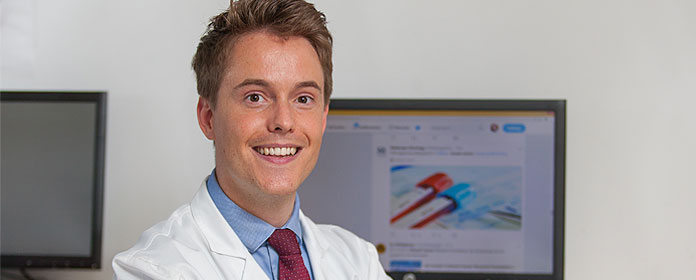When breast cancer is also defeated on Twitter
Dr. Rodrigo Sánchez-Bayona, graduate in Medicine from the University and resident of the Clinic, will present in Munich a study on the presence of the disease in social networks.

Twitter is a place where many cancer patients turn to share their experiences of the disease. This is the finding principal of a study conducted by Dr. Rodrigo Sanchez-Bayona, a resident in Oncology at the Clínica Universidad de Navarra and partner professor of the School of Medicine. The work, which analyzes the content of more than 6,000 tweets and retweets about breast cancer, will be presented in Munich during the congress of the European Society for Medical Oncology 2018. It has also been selected by the committee Press of the congress as work of special interest.
According to the author, social networks have become a loudspeaker in which every social problem has a place, including cancer: "Many of the patients we see use social networks to search for information about their disease and, as physicians, we wanted to know what subject content they are finding". At the same time, he explains that the volume of posts on Twitter provides "a huge amount of information to analyze the attitude, coping and speech surrounding the disease."
Dr. Rodrigo Sánchez-Bayona, graduate of the School of Medicine, collected for this analysis all tweets posted with the hashtag #BreastCancer over a seven-day period and categorized them according to their content, goal, subject of Username and whether they showed a stigmatizing attitude toward the disease. The tweets were also grouped into four subtopics: diagnosis, treatment, prognosis and prevention.
This study is part of a project multidisciplinary created to observe the presence of different diseases on social networks. "In 2014 we discovered that cancer was the most mentioned pathology on Twitter worldwide and we decided to take a closer look at breast cancer because it is one of the three most frequent tumors and the leading cause of cancer death in women," comments the specialist.
Social networks for prevention educationThe data collected included 3,703 original tweets and 2,638 retweets. "When we examined them, we found that only one in three possessed medical content," explains Sánchez-Bayona. "However, 90% of this information had appropriate medical content, perhaps because 40% came from healthcare institutions and public accounts." The classification by goal showed that the most frequent motive was to share the cancer experience staff , followed by patient advocacy. Likewise, the most common sub-theme was prevention, with 44.5% of the messages.
Of the 2,559 non-medical tweets analyzed, less than 15% contained stigmatizing expressions about the disease. For Sánchez-Bayona, the "numerous" breast cancer awareness campaigns have contributed to reducing the stigma associated with this disease. "In other tumors there is still a long way to go to make the disease more visible and break taboos. Cancer should be talked about in a respectful, truthful and transparent way. This is a task for society," he says.
The author concludes that this study "financial aid puts numbers to something we have been doing for some time now: that healthcare organizations can use social networks to publish appropriate and relevant medical information and cancer counseling in a way that is more accessible to users. We can use them as a new way to educate on cancer prevention, not just for patients, but for a much wider audience."
